Catholic Providence College is at a crossroads with its LGBTQ+ community
PROVIDENCE – A vanished Pride flag. A same-sex marriage announcement left out of the alumni magazine. Controversy over a LGBTQ+ prom. A tenured professor who, for years, has kept an anti-trans article posted on his office door.
This is the environment that, on an early April afternoon, prompted some 50 Providence College faculty, staff and students to hand-deliver letters of protest to the college's president, the Rev. Kenneth Sicard. Streaming into a conference room, the group unfurled a list of roughly 900 campus organizations, students, employees and alumni pushing the administration to more openly welcome its LGBTQ+ community.
Yet Roman Catholic doctrine, and PC's firm adherence to its teachings, have put Sicard in a no-win situation when it comes to appeasing the more progressive voices who want the school to evolve, and conservatives who may already think the president is pushing the envelope.
In an interview with The Providence Journal, Sicard said his goal is to emphasize human dignity, and "the fact that we're all created in the image and likeness of God. That everybody here is welcome."
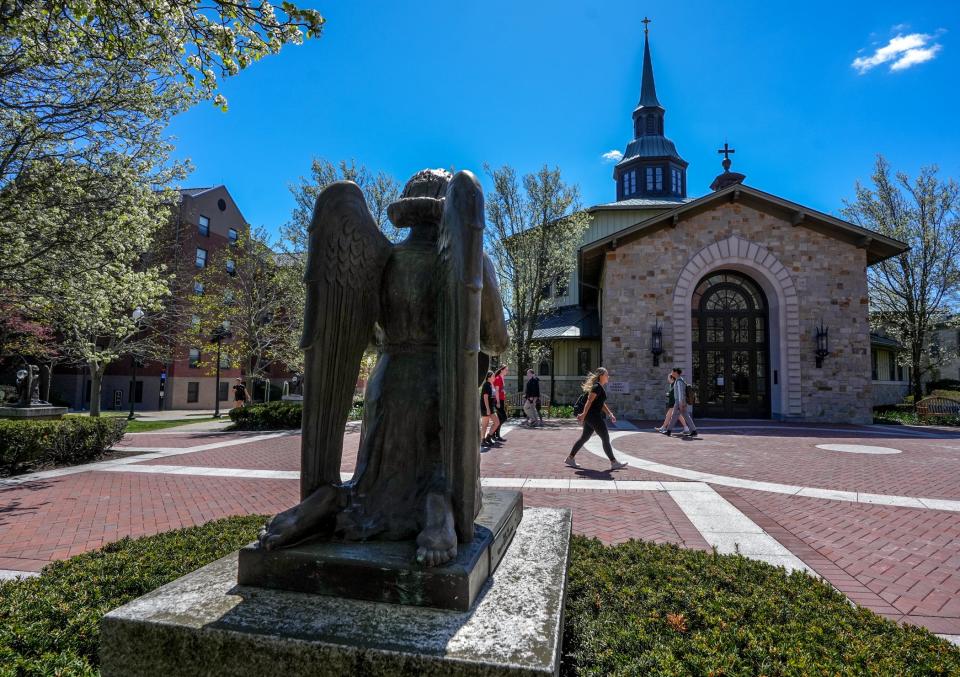
"It really troubles me to hear that some people don't feel that way," Sicard said. "And that's what I'm trying to address and imperfectly, I'm sure, but trying to take this really seriously. I don't think we're ever going to solve the problem completely. But again, nobody should feel unwelcome here."
Where did this all begin?
Recent tumult followed the resignation of E. Corry Kole, the college's director of Diversity, Equity and Inclusion education and professional development. Kole, who is nonbinary, left their post in March, allegedly because of obstacles put up around Kole's work by the administration.
The Journal has already reported at length on Kole's departure, which Kole claims was the result of discrimination. Sicard said he could not comment on what happened, and Kole is now seeking legal representation.
But as The Journal began speaking with more members of the campus community, some saw Kole's situation as part of the struggle on campus between its traditionally Catholic administration and its diverse student body, particularly those who do not adopt the church's positions on gender and sexuality.
The open letter asks the college to rethink its approach with a community dialogue on Catholicism and being queer, to support gender-affirming care, to permit the open use of the Pride logo and much more.
But some of the demands may be too much for the school.
'Cat and mouse game' to raise acceptance on campus
Part of Kole's job was to promote acceptance of LGBTQ+ people on campus, within the confines of what the Catholic college, run by the Dominican Order, would accept.
In February 2023, about a year before Kole's job ended, Kole brought PC alumna Maeve DuVally to campus. DuVally, who was featured in a New York Times profile that followed her coming out as a trans woman at Goldman Sachs at age 58, was asked to speak at PC as part of a panel of diverse guests labeled "different" in their workplaces because of their identities.
"I think it was kind of a cat and mouse game E was playing with the university, trying to slowly nudge them to becoming more welcoming and accepting to LGBTQ+ people," DuVally recalled.
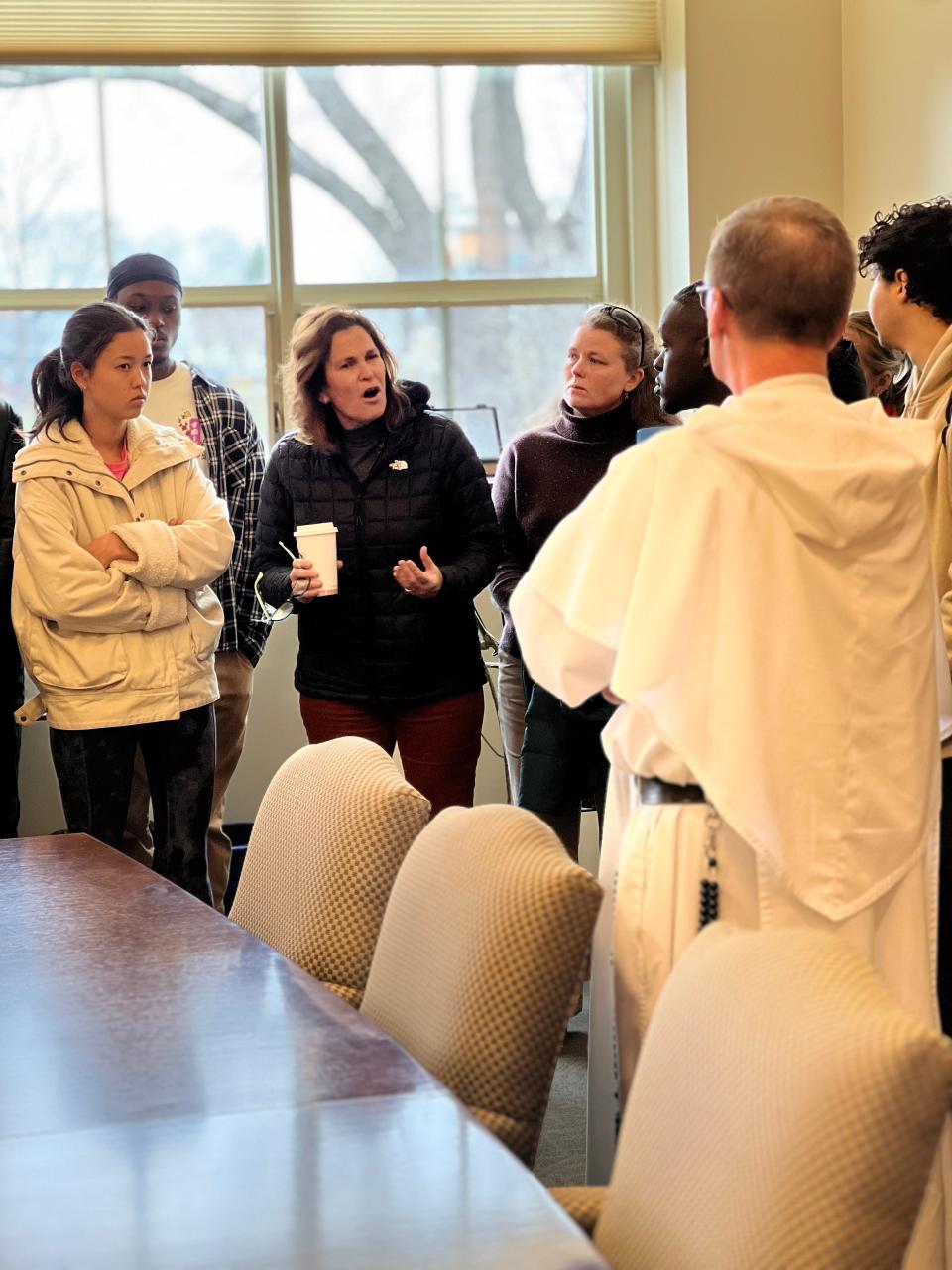
During the campus tour, DuVally remembers seeing the door for a club called SHEPARD at the Student Center. The acronym means Stopping Homophobia, Eliminating Prejudice and Restoring Dignity, but it also represents the name of Matthew Shepard, a gay University of Wyoming student brutally murdered by two men in 1998. At PC, this group embraces the LGBTQ+ community.
When DuVally passed by SHEPARD's door, she noticed it "was relatively sparse" in its decor. In DuVally's view, a passerby probably wouldn't have known what the purpose of the club was by looking at the entrance to its space.
That, campus advocates say, is how queer people have existed at PC – without being too loud.
An alumna's same-sex marriage announcement ignored
Cate Latz, a PC alumna who went on to work at the college for a decade, didn't come out until after graduating. While a student from 2009 to 2013, Latz said she "didn't know if it was OK to be openly gay." Nor did she know someone who was.
While working in the college's Office of Institutional Advancement, Latz was openly gay and said she felt supported for a while, sure that it was safe to be herself at work.
But when she married a woman in 2022, Latz felt a shift. She shared an office wedding shower with a colleague, and after returning from her honeymoon, she submitted a marriage announcement to the PC alumni magazine.
Latz never saw hers published.
"Then six months later," Latz recalled, "I get called into a meeting where I am told that the class note I submitted got sent up to cabinet for review and then the president decided it would not be included in the alumni magazine because of the Catholic definition of marriage."
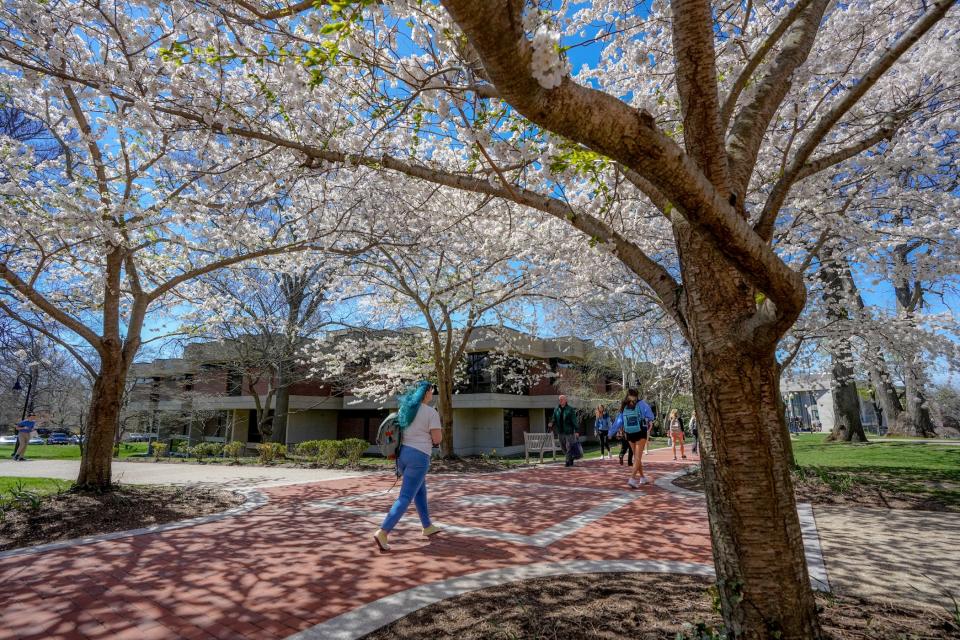
Asked whether it was a rule of thumb not to publicize gay marriage announcements on campus, Sicard said he didn't "want to go there yet," because the school is in the "early stages of discussion with our mission and ministry people and it's a sensitive issue."
"This is another area that we're still investigating, still looking into, and the church's position on marriage is clear," Sicard said. "It’s between a man and a woman, and I think that's probably where that is coming from."
A professor's anti-trans posting spawns a Title VI investigation
Like Latz, Chuck Toth had a long history working at PC. He started in 2000 as a part-time biology instructor, then rose to chair of the Biology Department and co-directed its neuroscience program.
In 2022, Toth resigned over another professor's effort to dismiss the idea of transgender people as bogus and a "contagion" that has "infected groups" of educated people.
The quotes come from "Transgender Delusion," a 2015 article by Richard Corradi, a Case Western Reserve University School of Medicine psychiatry professor. The piece appeared in First Things, a religious publication.
Giuseppe Butera, a tenured philosophy professor at PC, has posted the article on the door of his office since fall 2021. He keeps several copies in a folder so people can take one and talk to him about it. He suspects that lately, people have been coming by and tossing them in the trash. That's no issue for Butera, who simply opens a nearby filing cabinet, pulls out additional copies and refills the pocket.
Butera said only once has a student, who apparently liked the article, taken him up on his offer to discuss it.
But in the spring of 2022, the article sparked a complaint from Toth, who has a trans daughter and said the article upset about eight students and faculty – a small minority of PC's roughly 4,800 students and nearly 500 faculty.
However, a Title VI investigation unfolded with extensive interviews and rebuttals. Note: Title VI prohibits discrimination against "race, color, and national origin in programs and activities receiving federal financial assistance" while the more commonly known Title IX deals with sex discrimination. It was not clear why the college defined this as a Title VI matter, but Quincy Bevely, assistant vice president for institutional diversity and Title VI Coordinator & Title IX deputy coordinator, said, "our Anti-Harassment and Discrimination Policy prohibits more than discrimination against the protected characteristics of individuals mentioned in Title VI, which is why it is under my supervision."
Ultimately, Provost Sean Reid, citing free expression, allowed the article in question to stay on Butera's door, where it remains today.
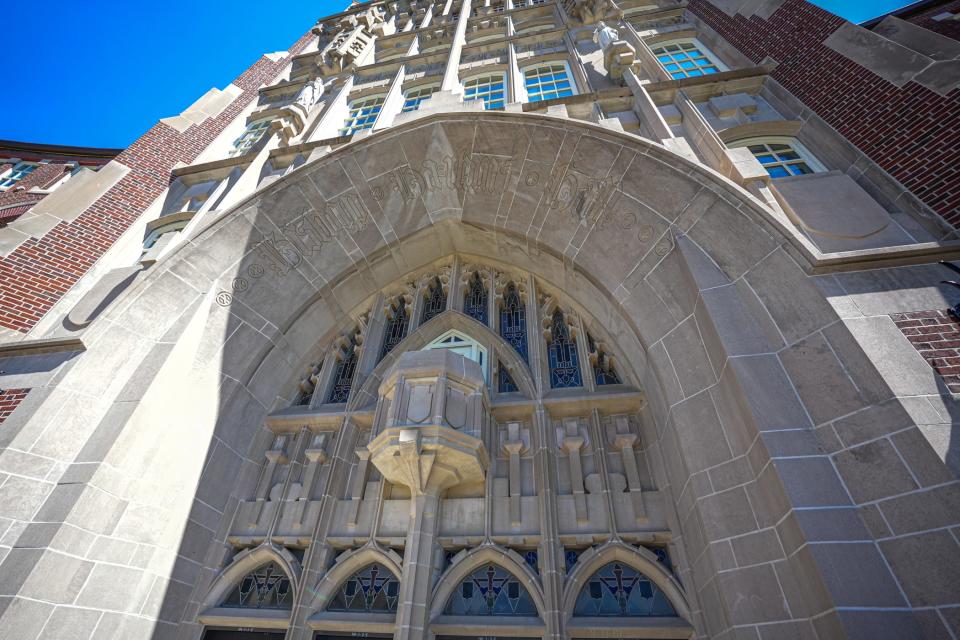
"I think that stirring up the hornet's nest is necessary sometimes," Butera told The Journal, disputing that the article is hateful and describing it as an attempt to "call a profession back to its senses."
Toth resigned before the results of the investigation were released, saying he couldn't come home to his daughter while taking money from the college.
While gathering his things to leave, he noticed that a Pride flag, which had been taped to his window behind a set of closed blinds, was gone or, as he believes, stolen.
A long debate over the word 'lavender,' and a campus club fighting for recognition
On campus, Christopher Arroyo has served as an advisor to SHEPARD, the group for PC's LGBTQ+ community. He says the school hasn't given the club firm guidelines on what is permitted, and what crosses the line when it comes to Catholic tradition.
A case in point: In spring 2022, SHEPARD organized a "lavender prom" – an event for students to socialize over tea and food. The color lavender has long been associated with the LGBTQ+ community, which caused concerns among some PC faculty.
Arroyo said backlash against the event, and the word, caused the administration to ban the word "lavender" – prompting Arroyo to file a Title IX complaint and for the school to research its origins.
"I guess I don't understand it well enough myself," Sicard said, "but I think the people that were doing the research into it ended up feeling OK."
Though the matter has been cleared up, it's an example of the difficulties SHEPARD faces in existing on campus and attempting to plan events.
SHEPARD's co-founder reprimanded for advertising campus club
Paige Clausius-Parks, now the head of education advocacy group Rhode Island KIDS COUNT, was one of SHEPARD's founders while a student at PC.
She described its founding as a time when she was "pleasantly surprised" by much support on campus, so much so that she was able to gather 200 signatures in just a day to make SHEPARD a club.
"Overall, starting the club was a good experience," Clausius-Parks said, adding, "but then once we were approved, we ran into some of the barriers students are experiencing today."
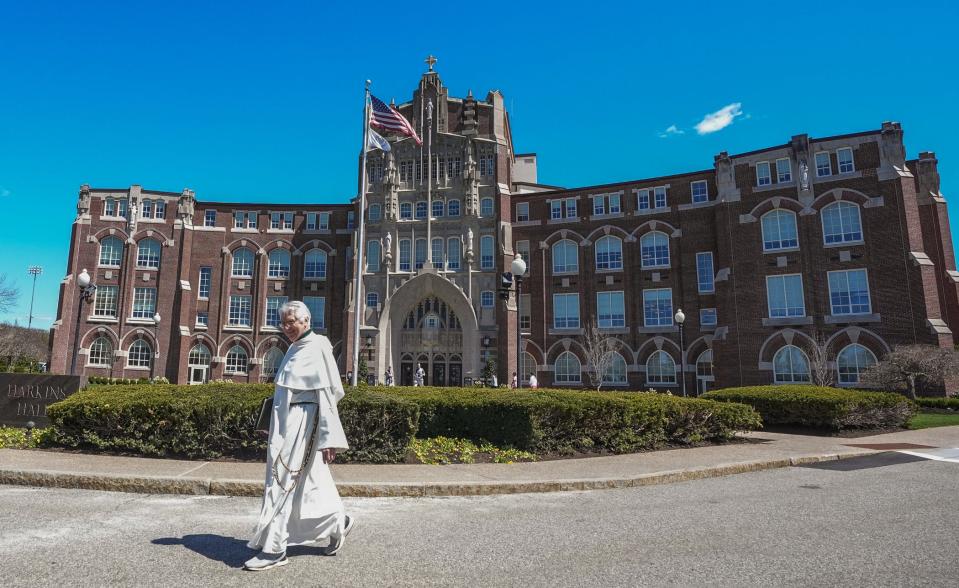
The club started with no budget, and it was expected not to make too much noise. Clausius-Parks recalls being told that she and fellow club members could not attend a local Pride parade. They did so anyway. As Clausius-Parks put it, her policy was that it's "easier to just do and beg for forgiveness than to ask for permission."
So she eventually took out an ad in Options magazine, Rhode Island's LGBTQ+ publication, announcing SHEPARD's presence on campus and listing its web address.
"We definitely got our hands slapped for that one," said Clausius-Parks, who was reprimanded at a meeting with school leadership.
Hannah Sorila, a former SHEPARD member who graduated in 2017, remembered the club as having a quiet presence.
"While I was on campus, they had a very small kind of office space that was their home base," Sorila said. "And when I even think about envisioning that, it feels very much hidden, siloed in a random corner of the building vibe."
As Sorila put it, to be queer on campus was to be caught in "a culture of silence and secrecy."
What's the latest? The cancellation of an art show on campus
Recently, a canceled art show from local artist Shey Rivera, who is nonbinary, has ratcheted up tensions on campus.
Rivera's work was supposed to be in a months-long exhibition with Providence College Galleries, but Provost Sean Reid canceled the show in March. The reason? A work, not actually part of the show, which depicted the Virgin Mary and the baby Jesus with horns on their heads.
Reid called the work "hurtful and offensive" to Catholics, going so far as to call it "sacrilegious," and Sicard described the horns as "devil horns."
Rivera's work, called "Prayers to Nana Buruku," plays on cultural influences from Puerto Rico, the Caribbean and West Africa.
The open letter signed by Rivera and others and delivered to Sicard alleges that the cancellation wouldn't have occurred "were the artist a white, cisgender man," a notion Providence College spokesperson Steve Maurano called "offensive," as the college has welcomed gay speakers on campus in the past.
The school has since scheduled listening sessions to discuss various issues on campus, from the exhibit's cancellation to queer inclusion at PC.
PC falls on the more conservative side of Catholic colleges. For those who disagree, why attend?
Some 40 miles south of PC is Salve Regina University, another Catholic institution that is more culturally relaxed. Past events have included an on-campus drag show, a forum on how to discuss your identity over a family dinner, and a Coming Out Week celebration.
Perhaps James Waters, a biology professor and Jewish trans woman, would have fit in more easily at Salve. Still, she chose PC, and the college wanted her, too, having hired her to teach its students.
"We love the mission of the school, we want to see faith and reason working together make the world a better place," Waters said in a text, adding that as part of the hiring process, new employees need to write statements supporting PC's mission.
"There’s nothing about our mission or the Catholic Church that requires anti-trans or anti-LGBT actions/prohibitions to defend a Catholic identity," Waters added.
'I don't think we're ever going to solve the problem completely'
Sicard has tried to emphasize the college's support for diversity, first with a statement in support of racial, ethnic and socioeconomic diversity, then, most recently, with a statement offering support to the LGBTQ+ community.
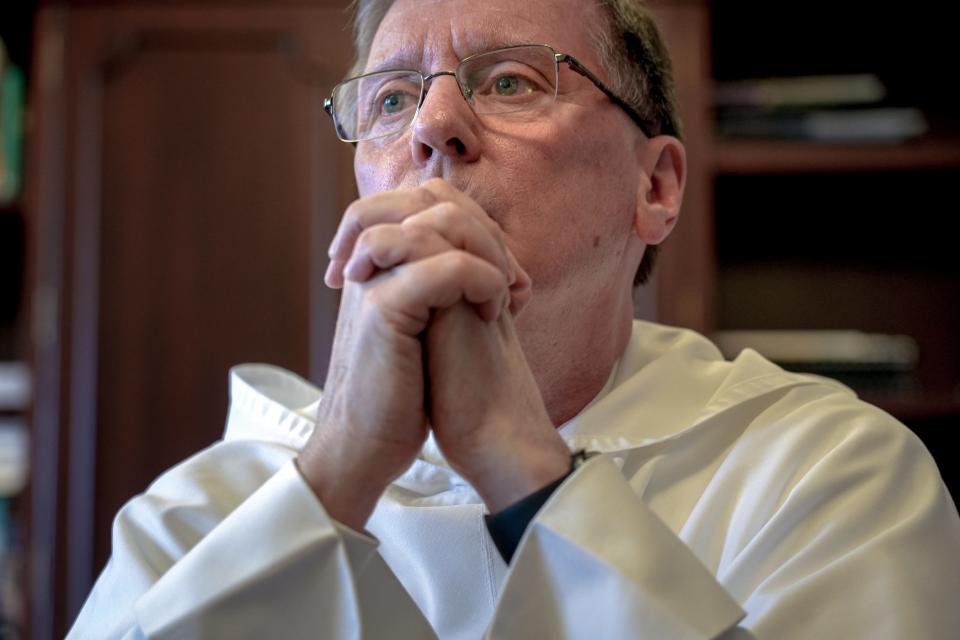
But members of the queer community see that latter statement – lengthy and theologically complex – as confirmation that Catholic teaching rejects its practices and lifestyles.
The statement, which invites "vigorous discussion" on gender issues while affirming the college's right to "maintain policies, procedures, and structures that are framed" by Catholic teaching, captures where PC is in this moment: straddling the line between radical acceptance and traditional values.
Bishop Richard G. Henning, who took over the Diocese of Providence last year and sits on PC's Board of Trustees, offered firm support for Sicard and his work on both statements.
"It has become difficult to dialogue in our polarized culture and so I am grateful for these courageous and thoughtful publications," Henning said in a statement. "They draw upon the fullness of Catholic theology and moral teaching and affirm universal human dignity and the compassionate accompaniment of persons."
But members of PC's LGBTQ community ask: When the college censors them while allowing an anti-trans article to remain posted on a professor's door for years, does everyone on campus have the right to complete free expression?
"I wouldn't say there’s total freedom to do whatever or say whatever people want to say," Sicard said. "I wouldn't want to stop people from expressing themselves freely, but I won't agree with everything."
Correction: A previous version of this story misstated Cate Latz's role while working at PC. It has been corrected.
This article originally appeared on The Providence Journal: Providence College's LGBTQ+ community says they are being shut out

